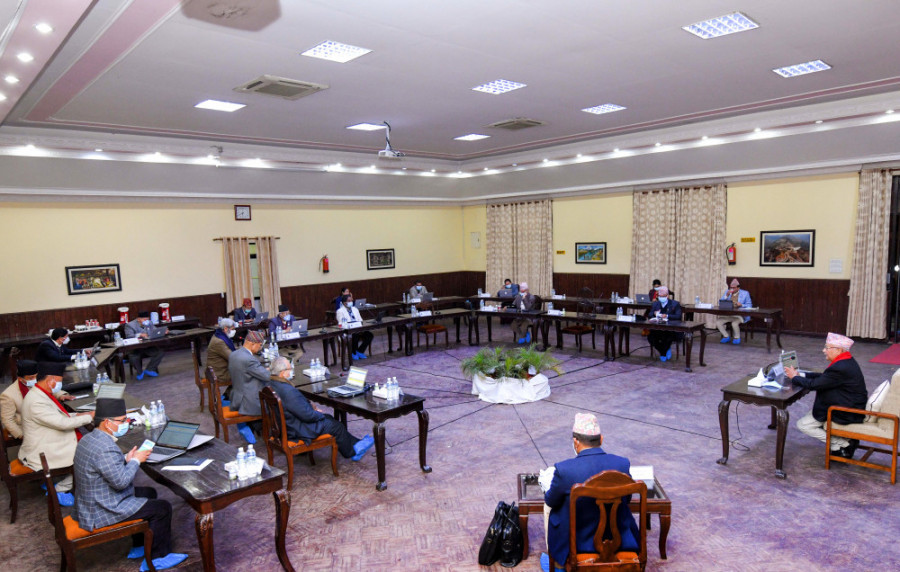Politics
Oli’s envoy appointments could erode country’s credibility, experts warn
Only two out of eleven ambassadorial nominees are career diplomats.
Anil Giri
The KP Sharma Oli administration last week made what was the country’s largest ambassadorial recommendations in the last two and a half years by nominating envoys to 11 countries.
The recommended names have been sent to the Parliamentary Secretariat for nomination hearings, but experts are already raising alarms that the roster of nominees reflects badly on the Oli administration.
Nine out of eleven nominees have been recommended under the political quota, and experts in the field of diplomacy say that their appointments could erode Nepal’s credibility in the international arena.
According to sources, Nirmal Raj Kafle and Jeevan Prakash Shrestha, both of them joint secretaries at the Ministry of Foreign Affairs, are the only career diplomats on the list of Oli’s ambassadorial nominees. Kafle has been nominated for the ambassadorial role in Austria and Shrestha in Egypt.
The other nine nominees were picked by President Bidya Devi Bhandari, Prime Minister Oli, Foreign Minister Pradeep Gyawali and some influential ruling party leaders, according to sources.
The Post made several attempts to reach Foreign Minister Gyawali for a comment on the government’s ambassadorial nominations, but he did not pick up his phone.
Foreign affairs experts say the Oli government has flouted the criteria for ambassadorial appointment since the rule prescribes a 50-50 even split between career diplomats and political appointees.
The criteria also talks about qualifications of the ambassador nominees, like their academic and professional track records, command over multiple languages and knowledge about country-specific foreign policies.
“But these recommendations do not adhere to the criteria set by the Foreign Ministry three years ago,” a joint-secretary at the ministry said on condition of anonymity. “The political appointees this time have little knowledge about diplomacy. Most of them do not even know the status of the bilateral relations of Nepal with the countries they have been nominated [to be stationed in].”
Madan Kumar Bhattarai, former foreign secretary, said a newly appointed ambassador should have full trust of the people of his or her country, the government and the diaspora.
“We need efficient and proactive ambassadors. But the government is picking people who are not cut out for the job,” Bhattarai told the Post. “I am not sure how the government will justify their nominations.”
Among the political appointees, Krishna Chandra Sharma, who has been nominated for South Korea, is a former head of the Central Department of English at Tribhuvan University; Sumnima Tuladhar, nominated for Australia, is a child rights activist; and Yubraj Karki, nominated for Bahrain, is a former general administration minister and former member of the foreign affairs department of the ruling party, CPN-UML.
Likewise, Ramesh Chandra Poudel, who has been nominated for Sri Lanka, is a former mayor of Biratnagar city; Narayan Prasad Sangraula, nominated for Myanmar, is a professor of History; and Kul Prasad Nepal, nominated for Brazil, is a former lawmaker of the ruling party.
Sumitra Subedi, who has been nominated for Denmark, is a primary school teacher and a relative of Rajan Bhattarai, the foreign relations adviser to Prime Minister Oli.
Meraj Musalman, nominated for Saudi Arabia, has long been associated with the Muslim wing of the ruling CPN-UML. Janga Bahadur Chauhan, who has been nominated for Russia, is a professor of English at Kathmandu University. He was educated in Russia.
A ruling party leader, who keeps an interest in foreign relations, said even he was surprised by the government’s list of nominees for the ambassador positions.
“I am not aware of most of the names,” the leader admitted to the Post. “We have made several blunders while conducting foreign policy in the past. I am afraid that we are making another mistake.”
“We need young, competent and qualified individuals to represent our country, particularly in those nations that are important to us,” the leader added.
Prem Khanal, head of the International Relations Department at Tribhuvan University, maintains a clear view when it comes to the appointment of ambassadors: individuals who do not have knowledge of diplomacy should not be appointed diplomats.
“How can an individual without knowledge of diplomacy and foreign relations secure and work for national interest? This could be another diplomatic disaster that we have already experienced in the past by sending unqualified, inexperienced persons to represent Nepal in foreign countries, only to recall them later,” Khanal told the Post.
Suresh Pradhan, former ambassador to Germany, said it is never good for the image of the country when ambassadorial appointments are made on the basis of political affiliation and not meritocracy.
“In some countries and besides some special circumstances, the ambassadorial appointment should be under the purview of the foreign ministry,” he said. “Ambassadorial post is not an on-the-job-training post. One requires vigorous and continuous study, training and experience.
The issue of ambassadorial appointments has long been controversial in Nepal. Even past governments have been known to nominate candidates based on their political affiliations, even if they were not qualified.
“A party that is in the governing seat appoints and fires ambassadors for their political interests and convenience,” Geja Sharma Wagle, a columnist who writes on foreign policy and strategic matters, said. “This is an unfortunate thing to happen to our country. Our leaders prefer cronyism over qualifications. They are unabashed about politicising government agencies and foreign missions.”




 8.79°C Kathmandu
8.79°C Kathmandu














